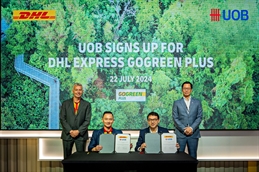
DHL Express and UOB have entered a strategic agreement under DHL's GoGreen Plus service to co-invest in sustainable aviation fuel (SAF) for the ASEAN bank's international parcel deliveries.
Through this program, UOB foresees reducing its annual emissions by approximately 200 tons of carbon dioxide equivalent (CO2e).
DHL's GoGreen Plus service—launched in February 2023—has helped over 40,000 customers in Asia Pacific cut their carbon emissions using SAF. SAF can reduce the lifecycle emissions of typical aviation fuel by around 80% compared with traditional jet fuel.
DHL said this demonstrates a strong demand for sustainable solutions across the express logistics provider's customers in various industries.
Meanwhile, UOB and DHL have been collaborating closely since 2022 to reduce UOB's carbon footprint of international parcel deliveries and have onboarded the GoGreen Plus service from March this year to utilize SAF.
"DHL has a clear sustainability roadmap, and we understand our role and responsibility to make air transportation more sustainable. We are proud that UOB has selected us to be their partner to help reduce their environmental impact on their international shipping activities," said Ken Lee, CEO DHL Express Asia Pacific.
"We are seeing a strong uptake of GoGreen Plus service in the region, citing shippers’ readiness and appetite for sustainable logistics solutions. SAF is currently the best option for reducing carbon emissions in aviation, and we are glad to be taking the lead," he added.
According to Dentsu's 2023 report for the banking and finance industry, 63% of Asia Pacific consumers recognized and felt the impact that climate change can bring about in the next five years.
As a result, consumers expect brands and their governments to take firm action to address sustainability.
The GoGreen Plus service is one of DHL's global initiatives to achieve net-zero carbon emissions by 2050, made possible due to strategic collaborations with BP and Neste to acquire up to 800 million litres of SAF and with World Energy to provide up to 668 million litres of SAF.



